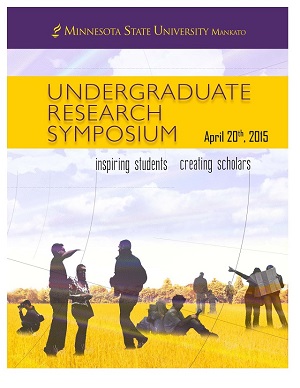The Garden of Forking Opinions: Lugones and Borges on Science
Location
CSU 202
Start Date
20-4-2015 3:15 PM
End Date
20-4-2015 4:15 PM
Student's Major
World Languages and Cultures
Student's College
Arts and Humanities
Mentor's Name
Adriana Gordillo
Mentor's Email Address
adriana.gordillo@mnsu.edu
Mentor's Department
World Languages and Cultures
Mentor's College
Arts and Humanities
Description
Latin American Literature has produced a number a famous authors in the genre of the fantastic. Among the most notable are the Argentine writers Leopolod Lugones and Jorge Luis Borges. While both of these literary luminaries dealt with advances in science and technology throughout their work, they diverged greatly with regard to their opinion about the role that science should play in society. While Lugones considered scientific progress to a grave threat to the moral fabric and well-being of society, Borges believed that scientific theories underpin and intersect with a variety of different experiences and thus can serve as tools to explore human perception of reality. A textual analysis of two short stories clearly illustrates these stark differences. The opinion of Lugones is evident in the short story, “Viola acherontia” (“The Acherontia Violet”) while that of Borges is well-defined in “El libro de arena” (“The Book of Sand”). In the end, Borges’ treatment of science proves quite versatile and in contrast to Lugones’ fears, has helped lead the way to solutions to problems facing modern society.
The Garden of Forking Opinions: Lugones and Borges on Science
CSU 202
Latin American Literature has produced a number a famous authors in the genre of the fantastic. Among the most notable are the Argentine writers Leopolod Lugones and Jorge Luis Borges. While both of these literary luminaries dealt with advances in science and technology throughout their work, they diverged greatly with regard to their opinion about the role that science should play in society. While Lugones considered scientific progress to a grave threat to the moral fabric and well-being of society, Borges believed that scientific theories underpin and intersect with a variety of different experiences and thus can serve as tools to explore human perception of reality. A textual analysis of two short stories clearly illustrates these stark differences. The opinion of Lugones is evident in the short story, “Viola acherontia” (“The Acherontia Violet”) while that of Borges is well-defined in “El libro de arena” (“The Book of Sand”). In the end, Borges’ treatment of science proves quite versatile and in contrast to Lugones’ fears, has helped lead the way to solutions to problems facing modern society.
Recommended Citation
Zehnder, John. "The Garden of Forking Opinions: Lugones and Borges on Science." Undergraduate Research Symposium, Mankato, MN, April 20, 2015.
https://cornerstone.lib.mnsu.edu/urs/2015/oral_session_14/1




